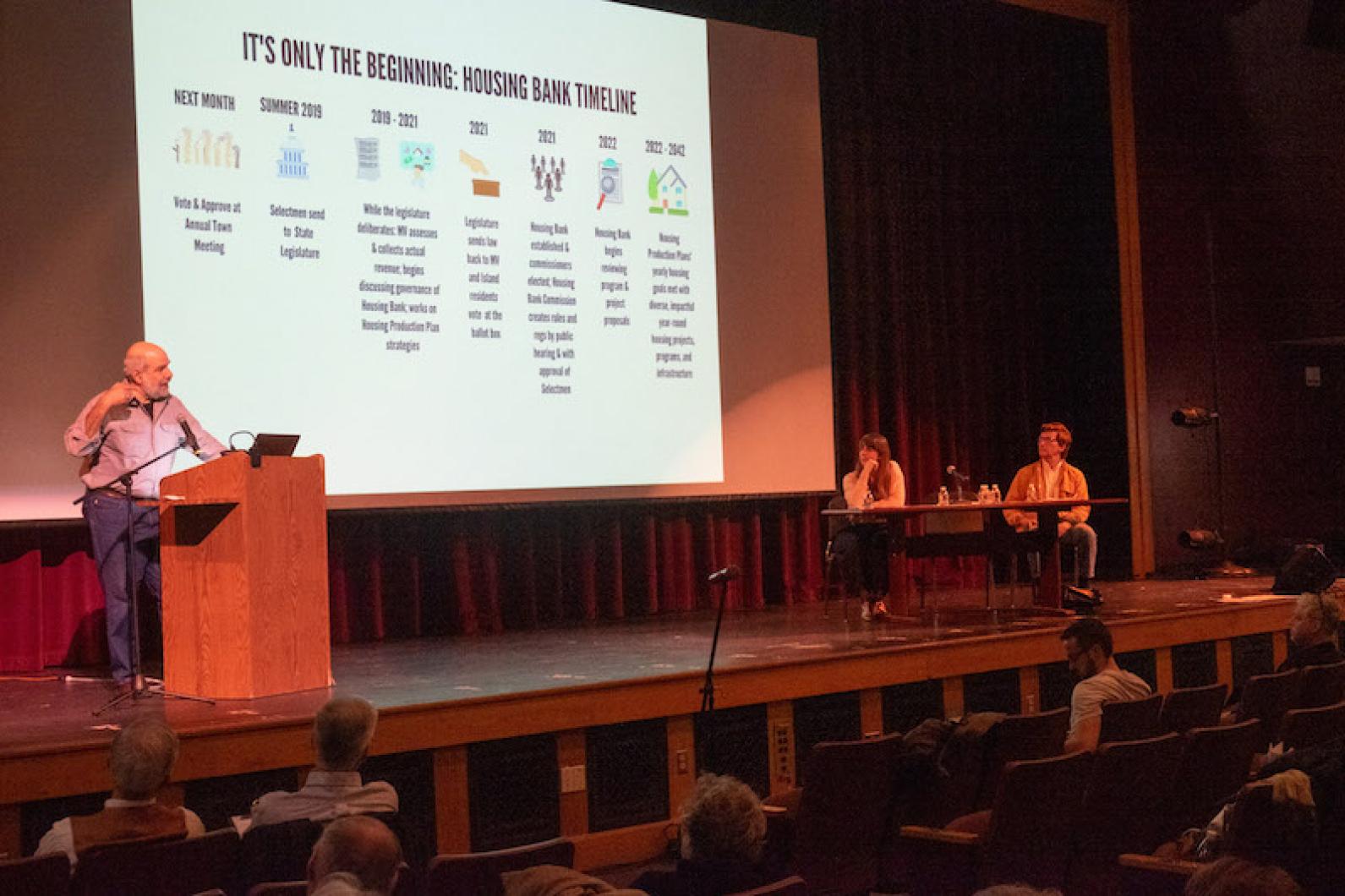At a public forum Friday evening, Islanders aired questions, concerns and support for a proposed housing bank on Martha’s Vineyard.
Proponents of the housing bank held the forum to discuss the details of two warrant articles they have successfully petitioned to go before voters on town meeting floor this season. The first warrant article would establish the housing bank as an Island-wide entity, similar in structure to the Martha’s Vineyard Land Bank, that would work with towns to construct and support year-round housing on the Vineyard. The second warrant article asks voters to allocate 50 per cent of the revenue from the recently passed short-term rental tax to fund the housing bank.
Although the two warrant articles have received pushback from down-Island selectmen who would prefer to use the new tax revenue to help balance already cash-strapped budgets, the housing bank listed hundreds of supporters at the forum on Friday and has galvanized a broader discussion about the Island’s housing crisis.
That discussion continued on Friday, as state representative Dylan Ferdandes told audience members that because they live in a “profoundly unaffordable district” state legislators would be open to creative ways to expand housing opportunities — as long as it passed at town meeting.
“I think everyone agrees that this is a massive issue that needs to be addressed,” Mr. Fernandes said. “And we are here to take whatever ideas you guys send to us and enact them through the legislature...but we need to hear from you at town meeting in order to do it.”
Housing bank representatives then spoke about the need for year-round housing on the Island and the history of past attempts to establish a housing bank. Doug Ruskin, vice president of Island Housing Trust, explained how the state-wide real estate lobby blocked a 2005 housing bank proposal that would have received funding from real estate transactions.
“Since that time, our housing crisis has deepened,” Mr. Ruskin said. “And if it is not addressed, it may very well shred the social and economic sustainability of our Island.”
But some Islanders who spoke at the forum on Friday felt differently. West Tisbury resident Abigail Higgins feared that efforts to house year-round residents would lead to unmitigated growth on the Island.
“Bringing more families to Martha’s Vineyard and providing housing for them seems like an admirable goal,” Ms. Higgins said. “But growing the Island community in a finite entity, which the Island of Martha’s Vineyard is, is ultimately destructive to everything we enjoy here.”
Aquinnah resident and housing bank advocate Peter Temple responded by saying that while elderly populations on the Island are set to grow over the next 10 years, the youth population will decline, partly because housing costs are prohibitive for young working professionals.
“We don’t see that building this housing will be the end of the Vineyard as we know it,” Mr. Temple said. “We hope that it will keep the Vineyard as we know it.”
Others who spoke at the meeting asked more logistical questions about the nuts and bolts of the housing bank and its enabling legislation. Dukes County register of deeds Paulo DeOliveira wondered whether towns would have the chance to alter the percentage of the short-term rental tax that would go to the housing bank once revenue estimates from the tax became clearer.
Mr. Ruskin said that both warrant articles are for home rule petitions, meaning they would have to get approved by the state legislature and then come back to Island towns for a ballot vote in a potentially two-year-long process.
“Each of these articles provides for the selectmen and the legislators to modify them as they see fit,” Mr. Ruskin said. “I can think of about half a dozen ways that this can come back from the legislature...but the point here is to get the ball rolling.”
Paddy Moore, chairman of Healthy Aging Martha’s Vineyard, said it was crucial to educate Islanders about the warrant articles because of the immediacy of the housing crisis.
“It’s really important that we vote to support this,” Ms. Moore said. “As I understand it, we have really not had a chance like this since 2005.”
Mr. Ruskin said furthering the conversation was paramount.
“The most important part of this is a robust discussion tonight and at town meeting,” Mr. Ruskin said.








Comments (21)
Comments
Comment policy »